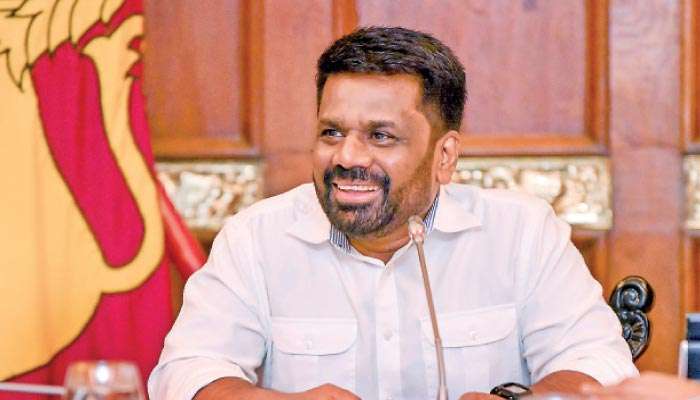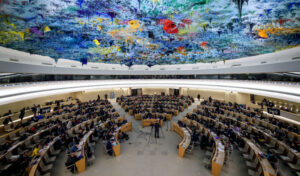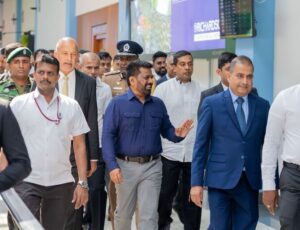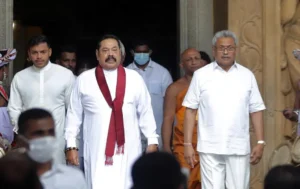
Wide Angle focuses on SL President’s Tariff Victory amidst Political Pressures
- CNL Reporter
- August 4, 2025
- Weekly Political Review
- SL President's Tariff Victory
- 0 Comments
Weekly Political Review
Govt secures U.S. trade relief but faces fresh challenges from UNHRC& RTI legal action
In what is being touted as a major diplomatic and economic breakthrough, President Anura Kumara Dissanayake (AKD) pulled off a surprise win last week by securing a long-negotiated reduction in trade tariffs imposed by the United States on Sri Lankan exports. After months of uncertainty that began with an initial 44% tariff hike under the trade policies of U.S. President Donald Trump, the figure has now been finalized at 20%, effective from August 7.
The tariff reduction comes at a crucial time for Sri Lanka’s fragile economy, which is heavily reliant on export-led recovery. The negotiations, which went down to the wire, saw President AKD’s personal intervention in the final hours before the U.S. Trade Department’s announcement. Sources reveal that until late on 30 July, Washington was adamant on maintaining the 30% rate. However, following last-minute deliberations under the President’s direct oversight, the final 20% figure was secured.

This political and economic coup is expected to bring significant breathing room to exporters in sectors such as apparel, rubber-based goods, and electronics. But observers note that AKD’s success came with strategic trade-offs — among them, possible commitments to align Sri Lanka’s raw material import duties from China with U.S. policies aimed at countering Beijing’s influence.
Behind the Win: Diplomacy and Political Maneuvering
While President AKD’s leadership is being credited for the successful outcome, Sri Lanka’s Ambassador to the U.S., Mahinda Samarasinghe, also received praise, particularly for his public diplomacy campaign that helped sustain bipartisan pressure from advocacy groups and Sri Lankan expatriate lobbies.
Nonetheless, the victory has awulso raised new questions. The United National Party (UNP) has demanded that the government clarify the “meaningful trade and security arrangements” made with Washington. Treasury Secretary Harshana Suriyapperuma later acknowledged that discussions included broader commitments involving the lowering of both tariffs and para-tariffs and opening up domestic markets to U.S. investment.
Opposition Leader Sajith Premadasa, head of the Samagi Jana Balawegaya (SJB), welcomed the reduction but argued that the Government should aim even lower, targeting a 15% tariff rate to remain competitive with regional peers like Vietnam and Bangladesh. He also called for a permanent team of professional trade negotiators to ensure Sri Lanka maintains its momentum in future rounds.
Pressure from the West, Silence on China
Despite the immediate gains, the U.S. is reportedly pressuring Sri Lanka to mirror its tariffs on Chinese imports—especially raw materials that Sri Lanka sources for its manufacturing sector, 40% of which comes from China. The AKD Government has so far avoided public comment on how it will navigate its delicate balancing act between Washington and Beijing.
How Sri Lanka responds to this diplomatic tightrope may set the tone for future engagements with other trade partners who could also demand preferential treatment now that the U.S. has secured concessions.
UNHRC Resolution on the Horizon
Even as the trade dust settles, the AKD administration is preparing for a more contentious arena: the United Nations Human Rights Council (UNHRC). With the current resolution on Sri Lanka expiring in September, Western nations—led by the UK and supported by Canada, Malawi, Montenegro, and North Macedonia—are preparing a new resolution focusing on accountability and transitional justice.

Ilankai Tamil Arasu Katchi (ITAK) MP M.A. Sumanthiran has confirmed that a fresh resolution is likely to be presented at the upcoming UNHRC sessions in Geneva. The new resolution could place AKD’s Government in a difficult position, having already rejected the previous one during last year’s Council meetings.
A Diplomatic Sojourn and a Political Coincidence
Amidst these developments, President AKD embarked on a three-day official visit to the Maldives from 28 to 30 July, where he held talks with Maldivian President Mohamed Muizzu. Several bilateral agreements were signed, including a deal on mutual legal assistance in criminal matters and an MoU for diplomatic training between the two nations.
Interestingly, AKD shared his outbound flight with Sri Lanka Podujana Peramuna (SLPP) National Organizer Namal Rajapaksa, who was en route to a private event. Both were seated in business class on the same flight but reportedly avoided political discussions, merely exchanging greetings.
Scandal in the Security Ranks
The President’s trip, however, was overshadowed by an embarrassing incident involving his own security detail. Seven officers from the President’s Security Division (PSD) were transferred after they were caught purchasing approximately 50 bottles of liquor from duty-free shops at Bandaranaike International Airport without valid travel documentation. The incident sparked public outcry and led to a formal complaint being filed with the Criminal Investigation Department (CID).

Among the officers transferred were a Chief Inspector and a Sub-Inspector, both now reassigned to remote stations in Galle, Elpitiya, and Matara. The episode has further raised concerns about the conduct and discipline within the President’s elite protection unit.
Legal Trouble Brewing: RTI Commission Left Headless
In a separate development, a Fundamental Rights (FR) petition was filed at the Supreme Court naming President AKD as a respondent. The petition, brought by journalist Mithun Jayawardhana and the Deyata Saviya organization, seeks a directive for the immediate appointment of an acting chairperson to the Right to Information (RTI) Commission, a position that has remained vacant since March.
The absence of a chair has effectively suspended investigations into pending RTI requests, undermining the public’s constitutional right to information. The petition argues that this inaction constitutes a violation of citizens’ rights under the RTI Act No.12 of 2016.
Shifting Sands in the Opposition: Moragoda Re-emerges
As the Government navigates foreign policy and legal challenges, the Opposition remains fragmented. Former Minister and ex-High Commissioner to India, Milinda Moragoda, is reportedly attempting a political comeback by initiating dialogue to form a broad-based Opposition alliance.
Moragoda, who has previously worked with multiple administrations including that of Mahinda Rajapaksa and Gotabaya Rajapaksa, is said to be in talks with several political heavyweights and civil society activists. Among those engaged in these discussions are Nimal Lanza, Dayasiri Jayasekara, and dissident SLPP members.

Yet progress has been slow due to growing frustration over the perceived inability of both Sajith Premadasa and Ranil Wickremesinghe to set aside personal rivalries. Their mutual distrust, critics say, remains one of the largest obstacles to the creation of a united Opposition front ahead of the next election cycle.
Conclusion
President AKD’s landmark achievement in securing the U.S. tariff reduction is undoubtedly a highlight in Sri Lanka’s economic diplomacy. However, the weeks ahead promise to be even more demanding, with the UNHRC poised to renew pressure, legal challenges mounting at home, and cracks widening across the political landscape. Whether the President’s momentum can be sustained or derailed remains to be seen in what promises to be a politically charged August

